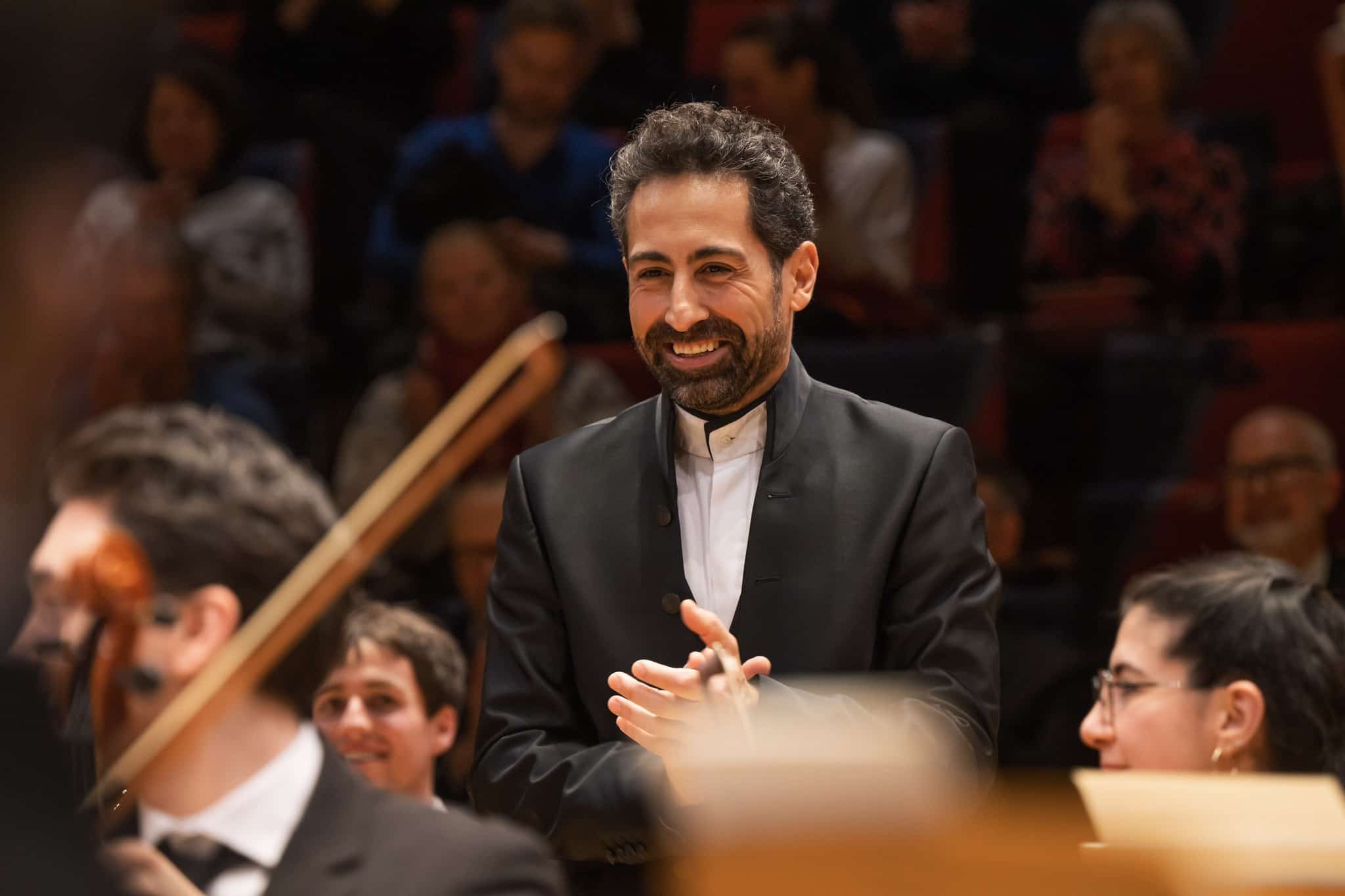I’m in the Met and I can’t hear a thing
mainThe veteran, widely-read critic Conrad L Osborne is convinced he heard electronic boosting in Il trittico last week, and in Marnie before that:
For my second Met excursion in a row, comment has been heard from the peanut gallery, where I’m usually to be found. At Marnie, it took the form of falsetto mockery, and came after the curtain calls. This time (Dec. 5), it came midperformance, as poor Sister Angelica, having just learned of the death of the little son of whom she’d heard nothing in her seven years at the convent, stretched out a supplicating arm toward her implacable aunt, and sang “È morto? Ah . . .” Now, I could almost swear I did hear something there, albeit it did nothing to disrupt the unnatural calm of the proceedings. But from three or four rows back came the comment: “What?” The voice was firm and clear, neither youthful nor elderly. The tone was not of ill-intentioned disruption, but of genuine inquiry, as in “Is anything going on down there? If so, would you care to share?” Later, the same voice registered another reaction, but I didn’t quite catch it, which put it in the same category as many of the remarks being entered by the evening’s performers.
After my Marnie post, in which I yet again had occasion to note the low level of vocal energy coming off the stage, I heard from the highly regarded coach and co-Artistic Director of The New York Festival of Song, Steven Blier. Emphasizing that “I’m just reporting—others heard it, too,” he wrote as follows:
“The night I went to Marnie I was in the standing room section, and it seemed to me that not much sound was coming off the stage. If you can’t hear the singers and chorus under that overhang, something is wrong. It’s a very voice-friendly, orchestra-muffling spot. Ten minutes into the first act a strange thing happened. A guy came storming up the aisle and confronted the usher, loudly. ‘I CAN’T HEAR ANYTHING! I’M IN ROW T AND I CAN’T HEAR ANYTHING!’
“‘Sir, there is nothing I can do about it . . .’
Aural enhancement has become very subtle. Even since I wrote the chapter of Opera as Opera entitled “The Enhancements” (which dealt mostly with the openly avowed practices of the New York City Opera for several seasons), it has taken long, surreptitious strides. With the best of it, a low general level can be established that boosts the voices just a bit, and/or an individual performer can be selected for assistance of an almost subliminal sort, all without telltale artifacts—unless someone makes a mistake. At a recent Broadway performance (of a play, not a musical, and let’s not get started on the latter), I had no suspicion of amplification beyond the now-necessary all-points alert until well along in the evening, when one actor’s voice suddenly popped out at triple or quadruple volume, and from a displaced location, for just a second—a syllable or two—and one realized he’d passed by another performer and picked up her amplification before anyone could jump on it….
Read on here.







Pandora’s box. Keep it closed.
The Met is just too big. American Dream – bigger is better – and thus compromised cretin of an opera house.
I guess subtle amplification can and at times already is done. But it needs costly resources. Excellent professionals who know what they are doing and are following the performance actively every moment. Not just ‘some sound guy’. But someone who is qualified to be a partner of the musicians and singers and can help them to sound their best. And the loudspeakers, masses of them, decentralised, close to the listeners, but invisible.
Just tear the whole thing down and build a more reasonably sized opera house is my suggestion.
The audiences are not there anyway anymore in our brain retardation times, particularly in the US, the world leader in brain retardation of the masses. Merry Christmas!
Sorry but once you start doing “subtle” it’s the beginning of the end and the opening of a slippery slope down a rabbit hole.
I agree. Experience just tells us that the professionals who have both the competence and maturity to keep it subtle, are hard to find, and then we have not talked about withstanding the pressure of the management, their bosses, to abuse it beyond subtle, yet…
But I agree with you in tearing down the whole thing for 2 reasons: diminished interest along with poor ticket sales and there are no voices of importance in existence capable of being heard without “subtle” electronic manipulation, aka FRAUD.
The Met is punishing to the singers’ voices. How many of you recognise what a thing of delicacy iw the human vocal apparatus? I agree it should be torn down. This hall is entirely unsuitable for the human vojce to the point of being abusive and harmful. Let there be expertly-skilled amplification so that we can enjoy beautiful voices without contributing to their destruction. Our lust for art should not be at the expense of their vocal folds. Just because Puccini’s opera house didn’t have the means of amplification doesn’t mean that opera cannot enter the modern era.
If you folks were in charge of culture and musical development, we would never have had the damper pedal added to the keyboard instruments, nor maybe even hammers!
Diction is far easier also with amplification, leaving more air to sing long lines powerfully. Perhaps your ears might be more thrilled with truly passionate singing on the breath consistently throughout an opera, including especially long, exhausting opera such as Wagner, if the singers could divert some of the massive effort of singing from aspirated consonants instead to using the breath for maximal shaping of the long line. You would not believe the amount of breath and effort it takes to achieve excellent carriage of consonants across a space such as thr Met to the people sitting in the far back. Leaving little left for beautiful shaping.
So many of you decry the quality of the singing today. There is a new emphasis on musicians’ health today and avoiding injury. The Met’s size works directly against vocal health. Perhaps these new singers are just being WISE and not choosing to abuse their longterm vocal health by singing everything at a “10” on their volume dial. I heartily endorse this. Let there be skilled, subtle amplification at the Met, and let us allow singers in this modern era choose to save their breath to create beautiful lines instead of spending much of their breath on “f’s” and “p’s” in order to get the farthest audience member to hear the consonants with full dramatic effect.
You guys are horrendous the way you’re taking affront. You’re the reason opera singers push and push their voices to the point of harm. Vocal health experts do not approve of the size of the Met for singers. Bring opera into the 21st century and allow the blessings of modern mechanisms to subtly improve the situation for both singers and audience- for singers, by avoiding vocal damage, and for audience, by the increased ability to shape the vocal line on the breath as powerfully as in a smaller hall and we gain in expressiveness!
Again, the idea of the damper pedal on the piano and its acceptance come to mind. Direct parallel.
The article should have Gelb and other administrators shaking in his boots and not just at the Met. Opera is meant to be a purely acoustic art form. That this amplification business is going on and in increasing fashion should give many of us pause. We have reached a point where we can no longer trust what we are hearing from the stage. This should qualify not only as veritable scandal but as trigger to an investigation so that the Met, and not just the Met, comes clean and transparent on the matter.
A related YT on the same topic:
https://youtu.be/GE0_UxDDEdc
Agreed. There is no “law”, but opera companies and others should be transparent with audiences about the use of amplification. Some will appreciate the amplification, others will be horrified, and some may not care one way or the other. But let the chips fall as they may.
It’s the same with ballet companies that choose to employ piped-in music instead of a live orchestra. Opinions will vary, but if canned music is being utilized, it should be clearly noted up-front; this shouldn’t have to be something people need to ask about when purchasing tickets.
Could Caravaggio please provide facts to support his statement «that this amplification business is going on and in increasing fashion»?
Wrong. The ball is on the other side of the court and it is: Let Gelb (and other intendants) come transparent and clean on the matter. The burden of proof rests squarely on their shoulders.
Likewise, it is up to journalists worth their salt to initiate in-depth investigative work and reporting on the matter. I concede that it is far easier for these writers however to continue entertaining, obfuscating and dumbing down.
I was there that night, seated on the far side of the first row of the family circle – an uncannily live spot for acoustics – and I heard the same thing. The performance did not sound amplified, but it sounded as if a mike was left on – in the prompter’s box, or in the stage wings – and comments not intended for circulation were in fact circulated. It happened twice, but not again, and not at all in Gianni Schicchi, which followed Suor Angelica. The performance did not at all sound amplified to me – I am down to about half a dozen Met performances a season, but virtually always sit in the same spot.
I have avoided the standing room at the rear of the orchestra for many decades because the sound is so dead.
I was first inside what I still think of as the ‘New Met’ weeks after it opened. In a way I am still trying to figure out the acoustics. The sound varies weirdly, sometimes from night to night, and from place to face. I found the spot I now favor somewhat by accident about ten years ago. I think the sets have a lot to do it – some sets generate echos and strange bounces, others, generally those with a firm backdrop somewhat downstage, clearly enhance the sound.
I have not heard any evidence (to my ears) of amplification, but I do recall a few concerning “sound effects” during a performance of Merry Widow (Fleming singing) where I thought – “is this being miked from above and somehow pushed out through the speakers?) – I thought “nah, that’s ridiculous” but it sounded weird and the singers’ tone ballooned and then fell back to “normal” depending on where they stood – and it happened to all the concerned singers not just one. So I thought – “they’ve somehow left a mike on somewhere” which is what you are saying. In any event, bring back Franco Corelli – a real singer who definitely didn’t need a mike!
Horrible acoustics at the Met. Most voices sound tiny to me there. Also, you pay a small fortune you can’t make out facial expressions as the place is cavernous.
Will New York Times music critics such as Tommasini or Woolfe rise to the occasion and for once write about a critical problem? But of course not. Take the case of Levine which only made it to ink once the ginnie left the bottle. After all, they earn their bacon as a direct publicity arm of the Met, specializing in essence in People Magazine-like puff pieces. This is what the NYT’s music criticism has devolved/dissolved to. The recent puff piece on behalf of the low rent rag Parterre Box is a case in point. That’s what these writers waste their time and ours on.
They have been using amplification in Montreal. It’s hard to pick up on, but I heard it from a critic who got the information from one of the singers.
At the Wilfrid Pelletier? 100%. But that hall is horrendous acoustically. And often, it is quite noticeable at opera performances.
It’s always fun to try to pick out where the tiny mic is positioned. Sometimes it’s behind an ear, sometimes it’s in the hair. Other times there’s no attempt at all to hide the thing, such as when it drapes down on the forehead like some sort of Hindu facial decoration.
The “mic” is often for live broadcasting, or else when the show is being filmed (for example, for television, or for film). Just because you see a microphone does not mean it is to improve the sound in the opera house.
Theatre, of course, is almost always “sound enhanced”. Although the Globe is going back to unenhanced voices, and sacked their last director over the issue.
I am suspicious of Opera North at Leeds and elsewhere in their semi-staged concert hall performances. In Electra at Leeds the singer of Orestes was placed at the extreme left of the platform and sounded to be in an entirely different acoustic from the rest of the cast. I wondered at the time whether he was being amplified (in which case perhaps the rest of the cast was also being subtly assisted) but gave him the benefit of the doubt. However I attended the same show at the Sage in Gateshead and blow me but there was the same effect again. So puzzled I was that I spoke to the singer afterwards, asking him if there had been amplification, and he assured me that he had been unassisted. Not sure that I believed him.
If one is on the top level of the Met (Family Circle and Balcony – the Peanut Gallery) and hears disembodied voices, this is almost certainly coming from the lighting staff directly above.
This phenomena really started around 2-3 seasons ago. At some performances they would have conversations throughout a performance – much to the aggravation of patrons below. The Family Circle/Balcony ushers at those shows got an earful from angry patrons.
They may not be having lengthy conversations anymore due to complaints but one still does hear occasional words and exclamations. Like the “what?” Conrad writes about.
And if one doesn’t know about the lighting staff talking, the source of their words does seem mysterious.
I don’t know what changed up high that’s caused this but this didn’t happen five and ten years ago.
I was there on the 5th.
As a longtime Met subscriber, it’s simply the house’s acoustics. The space is huge, and the sound goes up instead of out. Unlike a 1,500 seat opera house where everyone is seated relatively close to the stage, if a singer has weak projection, the volume level of their voice is diminished in the back of the house (the person who complained to the usher was in row T which is pretty far back — and remember, the stage doesn’t end at row A). It also doesn’t help that most Met patrons are over 50 — your hearing degrades with age.
The scenery can also interfere. You hear this as people move around the stage.
And going back to the performance on the 5th, Norman loves to attack the Met any time ticket sales are down; the house was packed that afternoon.
I tend to concur – the sound definitely tends to go up, especially from the pit. Seats upstairs have better sound and blend but seats downstairs are good for the voices as long as you aren’t too far back. Beyond Row Y and you’re under the overhang – those seats should be $10 because the sound is AWFUL there and of course even worse in the standing room behind at the very back, downstairs…
I attend the Met regularly, and I don’t believe they routinely use any sort of “sound enhancement”. I didn’t go to Marnie, btw. Every once in a while I have heard some sort of electronic feedback from backstage, probably from the stage crew.
The acoustics at the Met can be excellent depending on where you sit. I find the sound up in the Family Circle and Balcony to be the best for the voices. The orchestra level is the worst for hearing the voices,imho.
Didn’t Fischer-Dieskau talk of Met.amplification back when the house first opened? I don’t believe it’s “news” anywhere these days!
I thought DFD let “that” secret out many years ago.
I am pretty sure it’s the air conditioning, which was once all but silent but has become audible during the years since its last renovation in 2012. I had never heard the AC before this season. However, during two performances of La Traviata this month we could hear the AC kicking on. It generates a kind of white noise, which has the effect of deadening sound. I suspect that the sudden surges in volume that people perceive are actually the effect of the AC kicking off. When this happens the sound instantly blossoms and is very noticeably sharper.